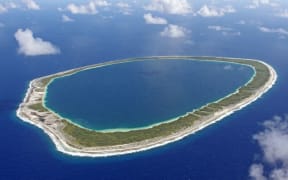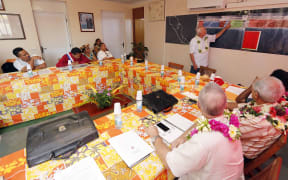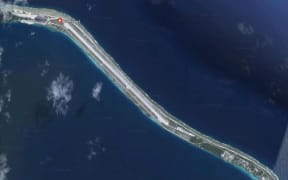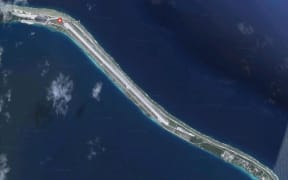China has restated that none of its fishing boats in French Polynesia is involved in any illegal fishing in the face of sustained criticism of China and its activities on social media.
Its consul in Papeete has appeared on television in Tahiti, countering once more claims which he describes as baseless and malicious.
He also expressed optimism that the region's largest fish farm will be built on Hao atoll by a Chinese company.
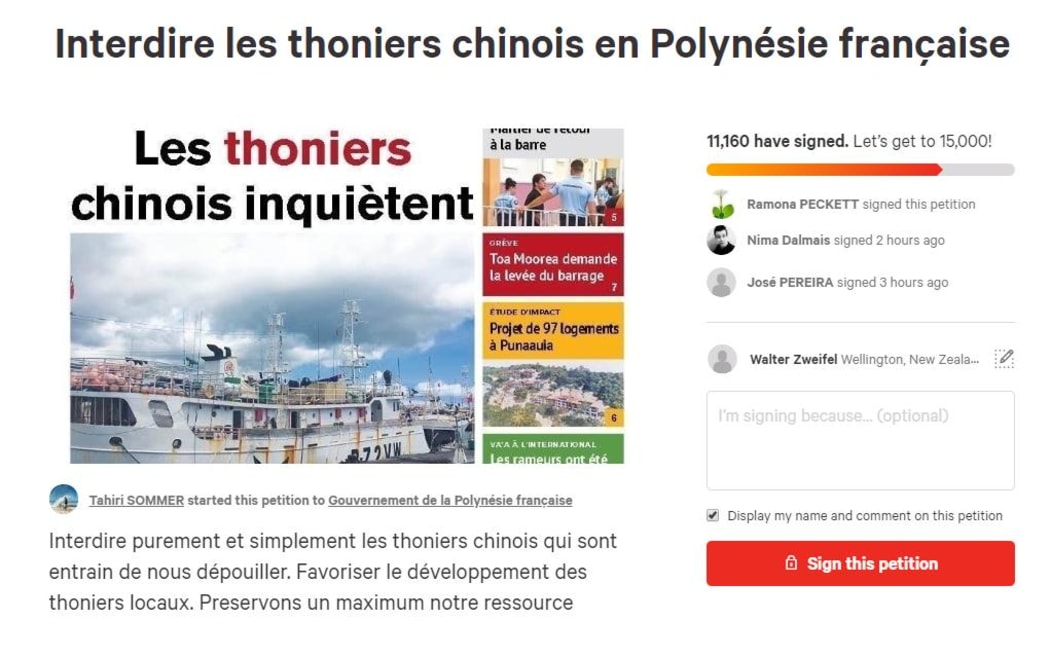
Online petition wants China's tuna boats banned from French Polynesian waters Photo: supplied
No Chinese fishing boat has been caught fishing illegally in French Polynesia.
But on social media, discussions on China's presence and intentions persist amid claims that there is poaching and suggestions that there is a cover-up.
An online petition has attracted more than 10,000 signatures in a matter of days, asking the government of French Polynesia to ban Chinese tuna fishing vessels from its waters outright.
There has been no mention of the petition in French Polynesia's media which are aware of the outpourings on social media.
Tahiti Nui TV gave China's consul Shen Zhiliang an opportunity to respond.
"These rumours are without basis and malicious. China is also monitoring. We have very strict laws and fishing businesses keep an eye on their boats day and night."
Last month, the Chinese consulate had already issued a written statement to say that Chinese boats comply with UN rules.
However, it did little to calm the debate.
The new chairman of the board of the Papeete fishing port Claude Davio told local television that for many Chinese boats the usual base is Suva in Fiji but it saves them time to drop their catch in Papeete.
"We see boats entering our zone. They are allowed to cross our zone, but they don't fish."
Mr Davio was upbeat about the Chinese fishing boats stopping in Papeete, saying they earn local businesses millions of dollars as the boats need maintenance work done before heading out to international waters.
The reporting by Tahiti Nui TV was appreciated by the French Polynesian vice president Teva Rohfritsch who thanked the station on Facebook for re-establishing the facts surrounding fishing.
"While they (China, Taiwan, South Korea, Spain, US) fish millions of tonnes to the west of us, we only take 6,000 tonnes in our waters and only with (French) Polynesian fishermen. No-one else comes here under threat of very hefty fines and international repercussions."
Yvan de Trogoff of the French government told Tahiti Nui TV that movements by all fishing vessels are monitored.
"The electronic surveillance is done above all with the VMS boxes which fishing boats have to activate. This gives a permanent position of the boats."
He said suspicious movements of any boat could be identified.
But on social media, people keep posting claims that Chinese boats fish illegally in French Polynesia.
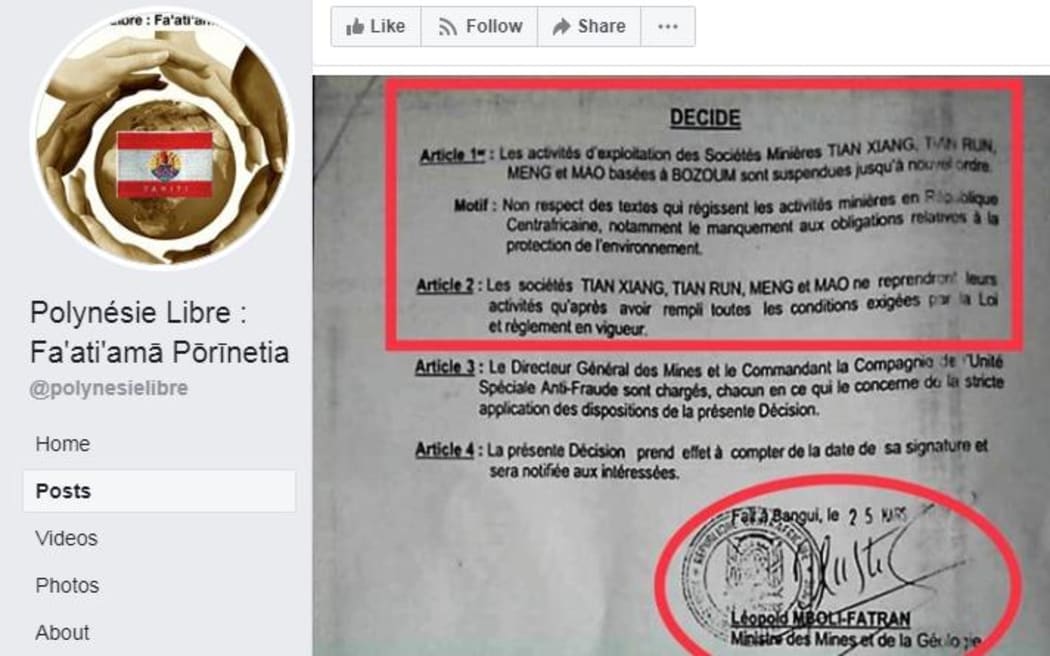
Social media in French Polynesia castigate Chinese businesses for breaches abroad Photo: supplied
While failing to identify alleged offenders, social media posts cited plenty of examples of Chinese boats being caught poaching elsewhere, from the Galapagos Islands to Argentina.
The criticism extended to Chinese exploitation on land, such as cases in Africa, by circulating court documents of Chinese companies' breaches.
Tahitian social media posts were also critical of the Chinese Communist Party's grip on society, with the suppression of freedoms and the tight controls, its treatment of minorities and religious groups as well as the alleged harvesting of organs.
None of these points were raised by the Chinese consul in the TV appearance.
"At an international level, there are people who denigrate China, but that is a small group," Mr Shen said.
Mr Shen went on to say that most Polynesians are in favour of cooperation between China and French Polynesia.
Many social media users mistrust the French Polynesian government and its advocates, resulting in bitter and at times defamatory exchanges.
Some of the discourse is tied to the aftermath of a prolonged rental dispute involving the Chinese consulate in Tahiti.
The credibility of some personalities in politics and media is being undermined by pointing at their criminal convictions, including French Polynesian president Edouard Fritch whose trustworthiness is questioned because he admitted to lying for years about the ill effects on public health and the environment from the French nuclear weapons tests.
While denouncing alleged fake news on social media, a prominent government employee retaliated and photoshopped a Facebook page to add a fictitious message by a real person.
The post has now been removed.
Hao fish farm
The planned fish farm on Hao by a Chinese company Tahiti Nui Ocean Foods remains illusive, but according to consul Shen Zhiliang things are fine.
He told Tahiti Nui TV that a Chinese bank delegation visited Hao last August to check out the site and to hold discussions.
"I believe that the programme is still on track. None of the two parties has shared with me any intention to abandon the project," he said.
Originally, the project was said to be worth about $US1.4 billion and in 2015, when the company first sought approval for it, people were told it should be able to employ about 10,000 people.
After spending millions of dollars of taxpayers' money upgrading the former French military base, the government last year formally authorised Tahiti Nui Ocean Foods to go ahead with its investment.
The decision came seven months after the government approved the terms for the construction of a much downgraded project, now said to be costing $US320 million.
The concessions given to Tahiti Nui Ocean Foods include a 30-year tax holiday on the importation of materials and fuel.
But since then the project has slowed and last month President Edouard Fritch said he was worried.
While saying he was still optimistic, he noted that things had stalled for almost a year.
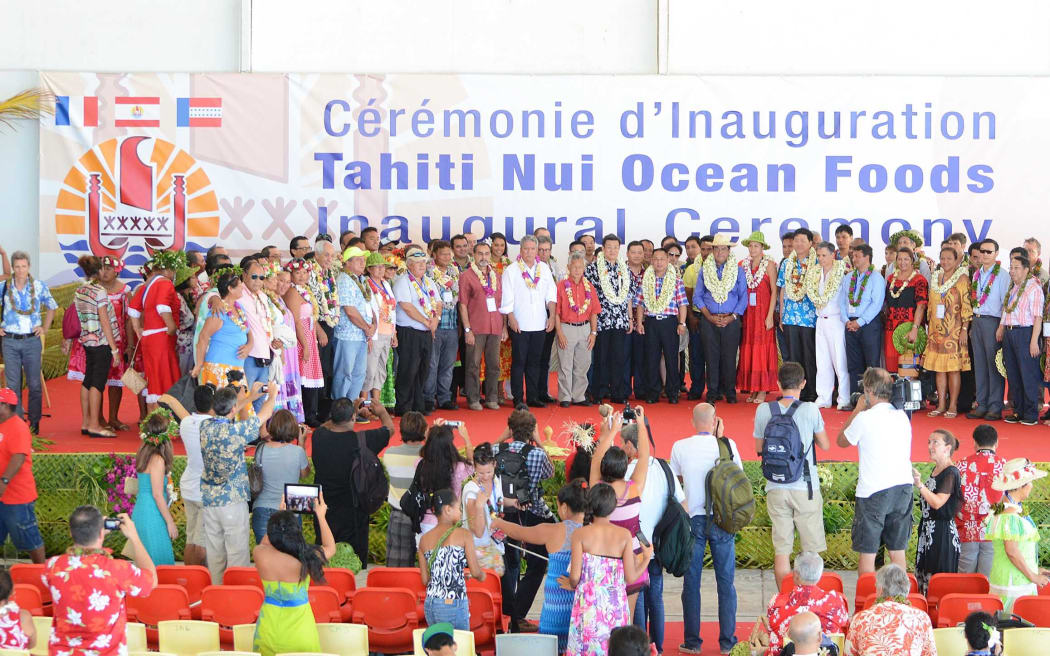
Fish farm project launched in Hao, French Polynesia Photo: supplied
Job prospects have also waned and the latest estimates speak of possibly hundreds of jobs that will become available to help lower French Polynesia's unemployment.
The figures are derided on social media and there is suspicion that the fish farm won't be built.
In 2012, when an earlier project on Hao was mooted by another Chinese company Taijin Jasmin Fund Management Corporation an investment of $US100 million was suggested, which Mr Fritch's party at the time described as unbelievable figures.
Speculation is that Hao, with its three-kilometre runway built for the French military in the nuclear era, will only be used as a refuelling and transshipment point.
From the very outset of plans to use Hao for aquaculture, there have been environmental concerns.
One critic, politician Moetai Brotherson, said last year it was wrong to use an atoll polluted by radioactive waste and in addition uneconomical to farm groper by feeding them imported sardines.
Mr Shen said for Chinese companies the protection of the environment is important.
"I know there is disquiet and it is understandable. Since the launch of this project there have been studies. [French] Polynesia and France have submitted a list of questions to ensure that the project goes ahead without damage to the environment," he told Tahiti Nui TV.
The company keeps finetuning its project by making alterations to the layout.
Last month, the government said by mid-March a delegation would head to China to advance the project but nothing has been reported about the visit's outcome.
Mr Shen said French Polynesian engineers would go to Shanghai soon.
All the while, reports say containers with materials to start setting up the Hao plant are on their way from China and due within days.
There is, however, no word if any of the local people have been hired for the project or whether Tahiti Nui Ocean Foods will also import the labour to get started.
It, however, appears certain that criticism of the project, and of China, will continue.

